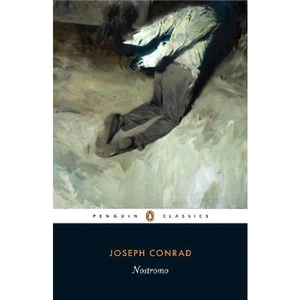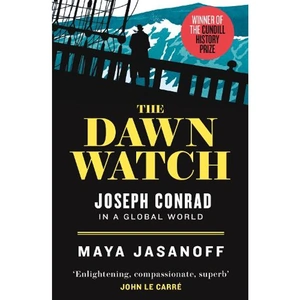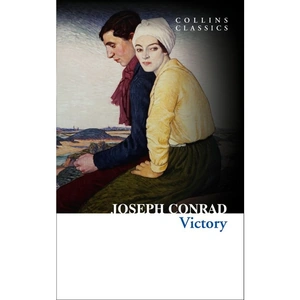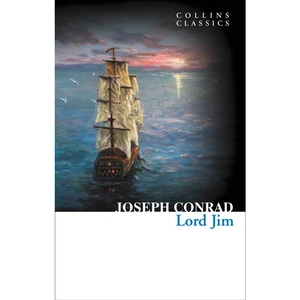The Book Depository Nostromo by Joseph Conrad
717 ratings
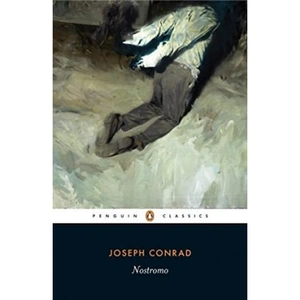
TO EXPLORE MORE
Price: £9.99
Brand: The Book Depository
Description: Nostromo : Paperback : Penguin Books Ltd : 9780141441634 : 0141441631 : 28 Aug 2015 : First published in 1904, this book deals with Latin America. It offers a picture of an insurrectionary society and the opportunities it provides for moral corruption. The Book Depository Nostromo by Joseph Conrad - shop the best deal online on thebookbug.co.uk
Category: Books
Merchant: The Book Depository
Product ID: 9780141441634
MPN: 0141441631
GTIN: 9780141441634

Author: Cowardly Lion
Rating: 5
Review: This is a fascinating book. I fully agree with the reviewers who advise others to stick with it, because it rewards perseverance. I was reminded, by its setting and scope, of One Hundred Years of Solitude by Gabriel García Márquez. Although the style and structure are different, both books vividly evoke the turmoil of 19th century South America, and "live in the mind" long after the reader puts them aside. I found aspects of Nostromo puzzling or unsatisfactory. However, the comments below are minor criticisms in the context of what is an ambitious and successful novel. A "classic"? You'll have to judge for yourself. Background Conrad spent two years in South America doing research for this book and it seems like he didn't want to waste any of his material. The novel is packed with characters, description and incident; perhaps too packed, although that's according to the taste of each reader. His contemporary, Anton Chekhov, would have filled three or four volumes of short stories with the material Conrad shoehorns into Nostromo. However, he probably couldn't have stitched it all together in the masterly way that Conrad does for this long novel. Personally, I think he could have improved (or perhaps "streamlined") the book by reducing the number of characters by about 30%. Did he really need two rebel leaders called Montero? What's the point of building up the back story of the bandit Hernandez if we're never going to meet him? Would the Viola story have worked better if he'd only had one daughter? What does Father Corbelan add? We're told that Conrad originally planned this book as a novella. He was clearly right to expand it, but perhaps he bulked it up too much. Heart of Darkness remains his most famous work for a reason: he didn't overload it with characters and sub-plots, so the power of the central concept is allowed room to breathe. Characters The most successful characters in this book are the supporting players - Emilia Gould, Dr Monygham, Antonia Avellanos, Captain Mitchell - who are beautifully drawn. By contrast, the eponymous hero, Nostromo, verges on the cartoonish, performing daring deeds and being "magnificent" for most of the novel, before turning moody and introspective as fate catches up with him. He is one of Conrad's "Good Men Who Turn Bad" after fate deals him an unfair hand. Other characters queue up to say how strong, marvellous, brave, faithful etc. he is. However, the direct evidence for this is thin. In the first half of the novel we mostly glimpse him dallying with women, dominating the men who work for him at the dock, and rushing around on dangerous errands given him by his superiors. Once the real action of the novel begins we see much more of him, and observe more of the action from his perspective, but disappointingly he is portrayed as alternately querulous, callous and disillusioned. The second major character is Charles Gould, the owner of the San Tome silver mine. Although a native of the country by birth, he is of English descent and behaves throughout like the quintessential Victorian gent: cold, taciturn and aloof; so reserved that we never get a rounded view of his character (unlike his wife). His only quality of note is the bloody-minded determination to make a success of the mine. However, the only evidence that he's obsessed with his mission is that he keeps dashing off to spend the night there leaving his poor, childless wife alone. Conrad probably thought this type of driven, buttoned-up, upper-middle-class Englishman was so well known to his readers that just a sketch of his character would suffice; we would fill in the rest of the details on our own. However, if not extinct, this type of Englishman is far less common in the 21st century than in the 19th. Without a thorough explanation by the author of Gould's motivations, he just seems like a self-obsessed prig. Conrad could have taken a cue from his contemporary George Gissing about how to convey the stifled passions and desperation that often lurks below the surface of the "typical" Englishman. Gould's counterpoint is Captain Mitchell, a gregarious and affable (if dim) official of the port, who gabbles away at various points in the narrative as if to compensate for the mine owner's reserve. It's as though Conrad were saying: "I know not all Englishmen are clam-tight like Gould". The third and final major character is Martin Decoud, a dandy and intellectual who falls for the beautiful Antonia and gets caught up in the revolution, becoming a fervent advocate of a breakaway republic. Conrad uses the device of a letter written to his (Decoud's) sister to give us a first-person description of some of the events of the revolution in Sulaco from Decoud's perspective, so we get to know him well in a fairly short space of time (he doesn't feature until about page 100 and then fades into the background after about page 250). He's credited by some of the other characters as a leading light in the revolution. Despite this, Conrad could probably have written him out of the novel completely without affecting the narrative to any significant degree. If you know the book, try imagining it without the Porvenir (a news-sheet Decoud edits) and his luke-warm dalliance with Antonia, and picture the episode on the lighter with Decoud absent. Assuming Nostromo could have handled the craft on his own (which he could if Conrad had granted him a puff of wind for the sail) why did he need to bring Decoud along? Considering the way Decoud's story subsequently plays out, it would hardly have been a great loss if he had never appeared in the first place. Perhaps that's a harsh judgement. I expect Conrad would have defended him as a pivotal character, and perhaps as archetypal of the kind of European-influenced intellectual who tended to get mixed up in South American politics back then. I don't know. However, the main thrust of the novel could have remained intact without his presence, and a leaner, lighter narrative (although perhaps not as rich?) might have ensured. Yes, Nostromo feels guilty about leaving Decoud on the Great Isabel, but that's only a small element of the remorse he suffers in the second half of the book. Genre I've seen Nostromo described as an early modernist novel, and I can see why: the narrative is not linear and the perspective jumps around as we witness events through the eyes of different characters. However, in other ways this is very much a novel of the high-Victorian era. In fact, the final chapters based around the lighthouse are pure Dickens, and in their tone reminded me of our Mutual Friend and Great Expectations. That's not bad in itself, but it seems like an unsatisfactory way to wrap up a story than in other respects anticipates the mood and themes of English literature in the 20s and 30s. It's probably best to view Nostromo as a unique work that defies categorisation. It's not really modernist and there's not enough pure excitement to call it an action novel. There are some good psychological moments in it, but not many. Politics provide a central theme, but they are the politics of near anarchy. Capitalism confronts revolutionary zeal? Old world idealism falters in the face of global trade? All these themes, and more, are present, but none dominates. Conrad' real achievement was in blending them all into a successful whole. Perhaps he should have called his book Coastaguana, because ultimately the landscape of the country is the central "character" and most enduring image. A point of usage The following is taken from a comment I made on someone else's post about Nostromo. I've added it here really for my own convenience, so that all my scribblings about the book are in one place. I'd say his grammar is generally correct rather than impeccable. Who, for example, is doing the "discovering" in the following sentence, which occurs as Nostromo agonises over whether to risk discovery on shore after hiding the silver?: "To discover his presence on shore, unless after many days, would, he believed, endanger the treasure". The only agent in that sentence capable of discovering anything is the pronoun "he", and he (Nostromo) cannot discover himself. Conrad may have had legitimate artistic reasons for choosing to write that sentence as he did but no one could claim it is grammatically perfect. It's worth noting that the sentence makes more sense if the word "reveal" is substituted for discover. Perhaps he just chose the wrong word (he didn't: see my update below). There are other examples in the book where he seems to have done so, for example where he writes: "He [Holroyd] was completely unbending to his visitor [Gould]". I had to read this two or three times before I realised it meant the opposite of what it appeared to mean i.e. he was receptive or friendly to his visitor rather than stiff, formal and unwilling to make concessions. Perhaps Conrad was confused by the similarity of verbs such as unfurl, unwrap and undress, which are not used to form adjectives in English. Of course, you can be a great writer without having "impeccable" grammar, so all of this is moot. 24th February update: It seems I was wrong about "discover". While reading a translation (mid-19th century) of Father Goriot by Balzac yesterday, I came across the following: "The very knitted woollen petticoat ... is a sort of epitome of the sitting-room, the dining-room, and the little garden; it discovers the cook..." i.e. the shabby petticoat somehow reveals the presence of the cook. This led me to look up the word in the Oxford English Dictionary, which lists "divulge or disclose" as archaic meanings of the word discover; so it does work in the sentence quoted from Nostromo. You learn something new every day! Perhaps I'm also wrong about "unbending", although there's no mention in the dictionary of the sense in which Conrad uses it. 18th March update: I've been reading a few 18th Century books recently and in them the word discover
Author: Mr N D Willis
Rating: 2
Review: My second encounter with Joseph Conrad after Heart of Darkness, Nostromo, a Tale of the Seaboard (as the title suggests) contains many of the themes of the more renowned work: the sea, foreign climes. However, Nostromo is more of a tale of love, haunted pasts, duty and revolution. The action take place in the small coastal town of Sulaco in the republic of Costaguana, which in my mind I'd placed somewhere along the Caribbean coast of South America. The town is little more than minor port until Charles Gould reawakens his grandfather's silver mine, which looms over the town both physically and spiritually and brings riches, employment along with treatment treachery and death. While Charles Gould and his wife Emilia, the first lady of Sulaco, May be the town's principal players they are supported by a cast wandering Europeans, first among them is Gian' Battista, the captain of the dockside labourers and all round man for all seasons. Battista is the binding that brings together all strands of the story - the mine, the business of the port, the links with European homeland and the mastering of the new frontier and its people. The fortunes of the characters follow the fortunes of the silver mine, which brings prosperity and fortune but also jealousy, and notoriety. The plot follows the contours of a mountain, climbing the steep slope of development, bringing railways, telegraphs and riches before plummeting down into chaos and uncertainty. There is much to praise about this book. The atmosphere of oppressive climates and political unrest, the early days of European settlement and modernisation. There is also, to my mind at least, something lacking. Gian Battista is the constant, and his fortunes reflect the flow of the narrative, but the development of the wider cast never really materialises. On many occasions the reader is given a quick recap of how characters have been affected by events before the disappear, sometimes literally, into the sunset. Nostromo is a good yarn, if not thoroughly involving - a made for TV if not a Hollywood blockbuster. The atmospherics are excellent and readers may find themselves mopping their brow, but the character involvement that one might get in a similar story by, for example, Gabriel Garcia Marquez is lacking. For readers looking to sample Joseph Conrad I'd recommend Heart of Darkness. It has the same oppressive backdrop with an added menace.


